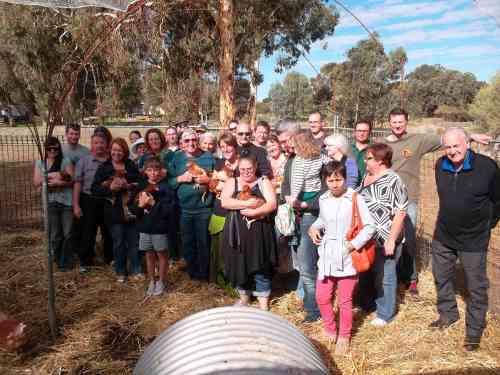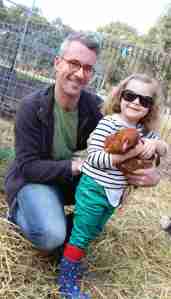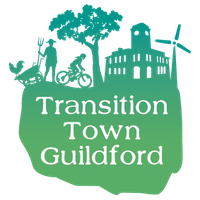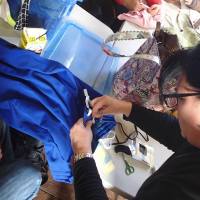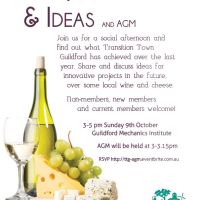One of the most enjoyable activities that Transition Town Guildford engaged in this year was the Sunny Side Up backyard hen project. This involved 25 households from the City of Swan that had never had chickens before, but were keen to learn. The aim was to reduce household organic waste to landfill by feeding kitchen scraps to hens instead. The course was supported by the WA Waste Authority, and involved basic coursework on hen care, feeding, housing and health, as well as a field trip. With the waste reduction theme, the aim was also to build the hen houses from recycled materials. At the end of the course, participants received 3 chooks: a retired battery hen, a ‘point-of-lay’ pullet (meaning a young hen destined for commercial egg laying), and a traditional breed of hen.
The cornerstone of the course was promotion of good hen welfare through appropriate housing, sufficient space (whether hens could range freely or not), and appropriate feed. These are all areas in which advice sourced through the internet is often conflicting and inaccurate. We also covered basic health care and parasite control. We had a great time running the course, and the participants were pleased to discover that their confidence grew as the course progressed. We thoroughly enjoyed getting to know everyone in the course, and participants have LOVED getting to know their chooks. People have clearly been delighted to discover how social hens are and what distinctive personalities they have. And… can’t beat the taste of home-grown eggs!
The course included a follow-up session a month after people got their chooks, with a degree of support thereafter so we could get a feel for common problems that people experience. We learned the following:
- Some households discovered their hens had feather mites, which are not well controlled by the parasite treatment regime that was recommended. This is because feather mites are not blood sucking parasites: they graze on scurf and dandruff (dead skin cells), so therefore do not get a good dose of medication. The best way to treat this is with a parasite dust.
- A few households had bad luck with sick or injured hens. The most common cause of illness and death was ‘yolk peritonitis’, which occurs when a yolk ruptures in the abdomen or egg gland, and becomes infected. This is incurable by the time it becomes obvious what the problem is.
- Popular names for ex-battery hens included ‘Energiser’ and ‘Eveready’
As for many of our other workshops and activities involving sustainability themes, participants in the Sunny Side Up project found that once they got on a roll with hens and kitchens scraps, it then became compelling to get into composting, work farming or other simple household sustainable living initiatives. We have loved running into course participants at other Transition Town events such as our movie nights.
We will not be running a full chicken care course like Sunny Side Up in 2014, but we will continue to run our annual Kitchen Gardeners backyard hen workshop (November), and also our annual chook workshop at Lockridge Community Garden. The City of Swan Libraries will also be running backyard chicken courses during the Easter school holidays, which Transition Town Guildford will be contributing to. If you are interested in attending any of these workshops, then please sign up to our Email newsletter, and check out the Upcoming events or Facebook page to hear more.
Barb
This project was supported by the Waste Authority through the Waste Avoidance and Resource Recovery Account. We also acknowledge the assistance of the Men of the Trees.

